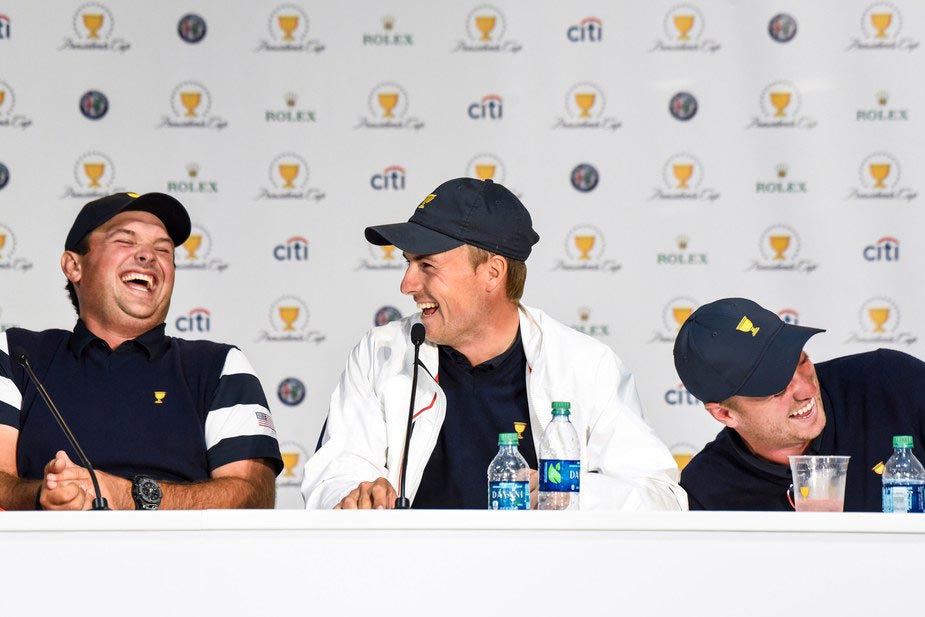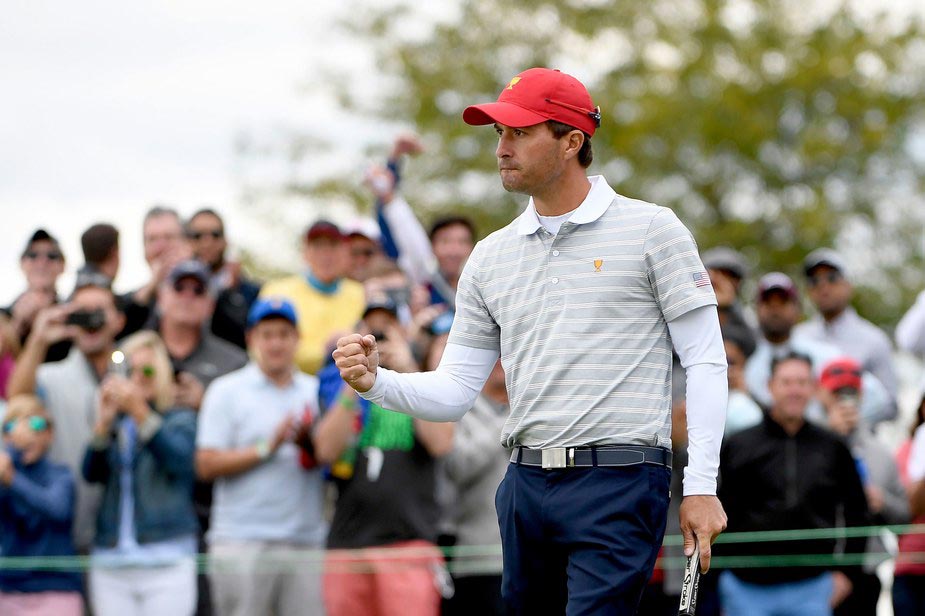Ernie Els is set to make his Presidents Cup captain’s pick on Thursday, Australian time, with Tiger Woods to follow on Friday, and I’ve already done my prognosticating/advice-giving for both the Internationals and the Americans. (Of course, Murphy’s Law dictated that Tiger had to go out and win an event after I predicted he wouldn’t pick himself, and Gary Woodland had to rediscover his form, which sort of dynamites the American post.) Now we wait, which means this a good time to look at past Presidents Cups and Ryder Cups and examine what makes a great captain’s pick.
In the most critical ways, asking that question is the same as asking: “What makes a good Ryder Cup or Presidents Cup golfer?” By my reckoning, it comes down to five qualities, and not necessarily in the order you might think. Starting with the least important quality, let’s count it down.
5. Form
As strange as it might sound, a player’s form entering a matchplay exhibition doesn’t matter as much as logic says it should. Yes, you can find examples of bad form persisting, as we famously saw with Webb Simpson in the 2014 Ryder Cup at Gleneagles, but more often the cauldron of a Cup renders recent results less critical than many believe. The heightened pressure, along with the format change to matchplay and the addition of a team, tends to stop individual momentum.
Last year’s Ryder Cup outside Paris is a perfect example. Thomas Bjorn went with four veterans, none of whom were playing remarkably at the time (and one, Sergio Garcia, was looking quite bad), and still they wound up ranging from “very good” to “spectacular”. Meanwhile, Tiger had just won the Tour Championship and Bryson DeChambeau had won two PGA Tour playoff events, and as two of Jim Furyk’s captain’s picks they ended the weekend with zero combined points.
Australian golf writer Ben Everill at the PGA Tour gave us another great example from the most recent Presidents Cup, when Mike Weir was chosen despite being 20th on the points list in 2007, and finished 3-1-1 for the Internationals, which, considering their general success in this event, is like going 10-0.
It would take a more thorough statistical analysis than I’m attempting here to dig really deep, but recent evidence proves that form isn’t the be-all and end-all. Obviously, you don’t want to take a struggling golfer, but simply choosing the four best players from the preceding month isn’t a strategy for success, either. It’s why, despite everything, Tiger should still look closely at Jordan Spieth – he’s too integral to these teams to leave out.
• • •
4. Chemistry
This is another paradoxical element that’s simultaneously important in certain ways and also completely overblown. Nobody wants to invite a clubhouse cancer into the mix. Still, for the same reasons mentioned above, matchplay events tend to blur the lines of camaraderie. Who can forget when Bubba Watson missed out on a captain’s pick in the 2016 Ryder Cup at Hazeltine National but decided to become the world’s greatest teammate as an assistant captain? Then there’s the old canard about how Europeans supposedly get along better with each other than Americans, which is fascinating until you learn – from any European you ask – that it simply isn’t true. We as journalists and fans are tempted to craft chemistry narratives, but more often than not the heat of competition makes for strange bedfellows. So while everyone on Team USA might like Rickie Fowler personally, it wouldn’t necessarily behoove Tiger to take him over someone less popular like Patrick Reed, nor should any American in his right mind be upset at pairing with Reed.

Friendship doesn’t win Cups, and in fact there’s only one position where chemistry really matters – the captain’s chair itself. There’s a reason that Ryder Cup teams captained by Nick Faldo and Hal Sutton and Tom Watson were eviscerated, and it has everything to do with leadership chemistry.
• • •
3. Ferocity
Fear is a killer. We see it over and over again, and of the Ryder Cups I’ve covered, one of the most memorable one-offs came in 2014 at Gleneagles. Paul McGinley, in an otherwise perfect captaincy, made his lone “mistake” when he selected native Scotsman Stephen Gallacher as a captain’s pick and never played him after the first session when it became clear that the stage was too big for him. (I put “mistake” in quotes because from a diplomacy angle, McGinley had to pick a Scotsman to play on a team competing in Scotland.) But it was most prominent in 2016, when Darren Clarke’s English rookies – Chris Wood, Danny Willett, Andy Sullivan, and Matthew Fitzpatrick – looked like they wanted to dig a hole in the Minnesota earth and bury themselves. Meanwhile, fellow rookie Thomas Pieters dealt with the hostile environment by decimating almost every American who stood in his way, including another fairly tough rookie named Brooks Koepka. Why? Because Pieters is a badass, and his English teammates were not. It doesn’t mean he’ll have a better career than the English four, or even that he’s a better player – it means that when faced with high pressure and a mano-a-mano duel, he’s up for it. He even enjoys it.
You can say the same for Reed, who, despite his Masters victory, is never one of the best strokeplay golfers at these events. Nevertheless, he usually dominates at matchplay, and it’s because competitive drive and a taste for blood matters more at a Cup than it would at a normal event when 99 percent of your opponents are literally out of sight.
• • •
2. Matchplay skill
I maintain that excellence in matchplay is a related but separate skill from excellence in strokeplay. Some, like Tiger, are great at both (don’t let his pairs Ryder Cup fool you into thinking otherwise), but it’s the examples of men like Phil Mickelson or Ian Poulter, who are far better at one than the other, that really proves the point.
To bring it back to captain’s picks, one way to judge this is by looking at respective players’ success in the WGC–Match Play compared to Ryder Cup and Presidents Cup success. Again, shorthand will have to do – in 2017 at Liberty National, we saw Kevin Kisner go 2-0-2 in the Presidents Cup in his first appearance in either of the team matchplay events. That made sense because he’s a dynamo at the WGC–Match Play, with a win and a runner-up finish the past two years. The same can be said for other winners and finalists like Dustin Johnson, Luke Donald, Henrik Stenson, Darren Clarke, Paul Casey, Victor Dubuisson, Rory McIlroy and the most obvious of all, Poulter. Another two-time winner and one-time finalist, Geoff Ogilvy, put together a 7-6-1 career record in the Presidents Cup, making him one of just 14 International players to hold a winning record. As mentioned above, Tiger’s pairs record in the Ryder Cup is shockingly bad, but he’s 4-2-2 in singles, and a Presidents Cup stud.

Of course, there are exceptions. Steve Stricker won the Match Play once but didn’t have a great Ryder Cup career, and the same can be said for Bubba Watson (both did well in the Presidents Cup, but it’s fair to argue that’s a low bar for the Americans). Matt Kuchar is the biggest anomaly of all – he’s got one win and one final to his name at the WGC event, but somehow managed to amass a losing record in the Ryder Cup and Presidents Cup, the latter of which is no small feat for an American. You can also complicate matters further by saying that singles matchplay is a different beast than pairs, and the WGC can only really tell us about singles. Still, in a general sense, success in the game’s biggest matchplay event predicts success in the Ryder Cup and Presidents Cups better than almost anything else. Except…
• • •
1. Good experience
This might be the simplest, tried-and-true fact of Ryder Cup and Presidents Cup competition: winning begets winning, losing begets losing. For years, the Americans got caught in the trap of talking about “experience” when it came to selecting captain’s picks and setting lineups in the Ryder Cup, but the plain truth was that an entire generation of golfers had only “experienced” losing, and those players tended to keep losing. That’s called “bad experience” and it should be recognised as such by any captain. The Europeans also have leaned on experience in their captain’s picks, and with rare exceptions (Lee Westwood at Hazeltine comes to mind), they’ve done well. McGinley and Bjorn in particular ran master classes on selecting “good experience” with their captain’s picks, and they had the luxury of being able to draw on two decades of winning.
These last two categories are why Tiger should pick Kisner, even though he probably won’t. It’s also why it won’t matter – in the Presidents Cup, he has a wealth of “good experience” at his disposal, from Fowler to Reed to Spieth to himself. Els, meanwhile, has almost none, and will be reduced to stocking up on either rookies or bad experience. With a 20-18-2 record in his Presidents Cup career, maybe Els should shock the world and beat Tiger to the punch by calling his own number tomorrow.



